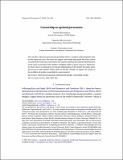Censorship as optimal persuasion
Abstract
We consider a Bayesian persuasion problem where a sender's utility depends only on the expected state. We show that upper censorship that pools the states above a cutoff and reveals the states below the cutoff is optimal for all prior distributions of the state if and only if the sender's marginal utility is quasi‐concave. Moreover, we show that it is optimal to reveal less information if the sender becomes more risk averse or the sender's utility shifts to the left. Finally, we apply our results to the problem of media censorship by a government.
Citation
Kolotilin , A , Mylovanov , T & Zapechelnyuk , A 2022 , ' Censorship as optimal persuasion ' , Theoretical Economics , vol. 17 , no. 2 , pp. 561-585 . https://doi.org/10.3982/te4071
Publication
Theoretical Economics
Status
Peer reviewed
ISSN
1933-6837Type
Journal article
Description
Kolotilin acknowledges financial support from the Australian Research Council Discovery Early Career Research Award DE160100964 and from MIT Sloan’s Program on Innovation in Markets and Organizations. Mylovanov acknowledges financial support from the Office of Naval Research Multidisciplinary University Research Initiative Award N0001417-1-2675 and from Kyiv School of Economics. Zapechelnyuk acknowledges financial support from the Economic and Social Research Council Grant ES/N01829X/1.Collections
Items in the St Andrews Research Repository are protected by copyright, with all rights reserved, unless otherwise indicated.

